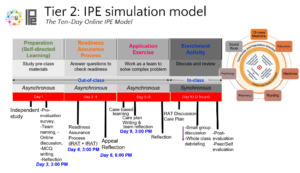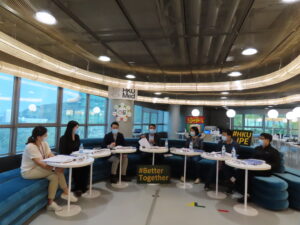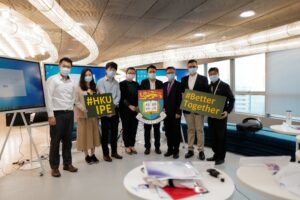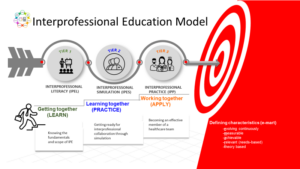e-News
New Phase of Interprofessional Education (IPE)
New Phase of Interprofessional Education (IPE)
Interprofessional education and collaborative practice (IPECP), like many other programmes, braced itself to creatively transition to online learning. This was our second year of implementing an Online Ten-Day Asynchronous and Synchronous IPE Model. However, many of this year’s initiatives in terms of programme design and technology support were newly conceptualized which were built from our lessons learned from our first year of implementation.

New pedagogy innovation in IPE
We strengthened the Application Exercise phase through marrying contemporary pedagogy and emerging technologies. For pedagogy, we used “Constructive Controversy” framework (Johnson & Johnson, 2015) where we underscored management of potential conflicts constructively in teams which may arise given the diversity of expertise. Through case management in small groups, teams in 5-7 interprofessional members developed an interprofessional healthcare management plans. With the facilitation of context experts, the intellectual conflicts resulted in critical thinking, higher level reasoning, motivation, and understanding of expertise of others. In addition to content experts, we partnered with student ambassadors to perform near-peer-teaching to facilitate within and between-team discussion.
For technology, running large-scale IPE would not have been possible without the advanced instructional technology called “Open edX” infused with Miro, Kahoot, Padlet, google doc. This platform is known for managing courses, tracking student’s progress, and learning analytics. Advance technology is very critical in managing a large-scale online programme.
We continue to scale out the relevance of IPE by adding new module in Dementia. This module accommodates Speech and Hearing Sciences from the existing collaborating programmes. We enriched effective communication elements in IPE through the involvement of Dr Pauline Luk. Feedback from both teachers and students has been overwhelming https://www.ipe.hku.hk/student-testimonies . For example, Dr Anderson Tsang expressed that he “came across very positive reviews on the IPE program from MBBS Junior Clerkship students upon reviewing their log book self-reflections in the surgical rotation”. We were invited to participate in the Open Classroom Observation for the HKU Teaching and Learning Festival 2021 where teachers observed how IPE was delivered. IPE team was awarded Third Prize Winner of the Poster Showcase.


Implementing Three-Tier IPECP
We developed a Three-Tier IPECP as an overarching framework – a theory-based spiral or tiered approach to IPE. An important design function is to reinforce learning allowing cyclical progression from simple to complex application to authentic tasks. This model is where activities are presented with increasing levels of complexity across the curriculum: Tier 1 (Interprofessional Literacy) as a prelude to Tier 2 (interprofessional Simulation) and Tier 3 (Collaborative practice; https://www.ipe.hku.hk/ ). This program approach is consistent with the revised Bloom’s taxonomy framework and Miller’s pyramid of competence.
The reach and impact of IPECP in our community is expanding locally and internationally. We are scaling up the programme to accommodate requests from other expertise in HKU to join IPE (e.g., Law, Engineering, Food and Nutritional Science). There is an ongoing discussion for potential inter-institutional IPE to involve Occupational Therapy and Physiotherapy students from Tung Wah College, The Open University of Hong Kong, and Caritas Institute of Higher Education. Internationally, to facilitate a border-crossing knowledge transfer through internalization, we are currently discussing with University of College London, School of Pharmacy for potential partnership.
